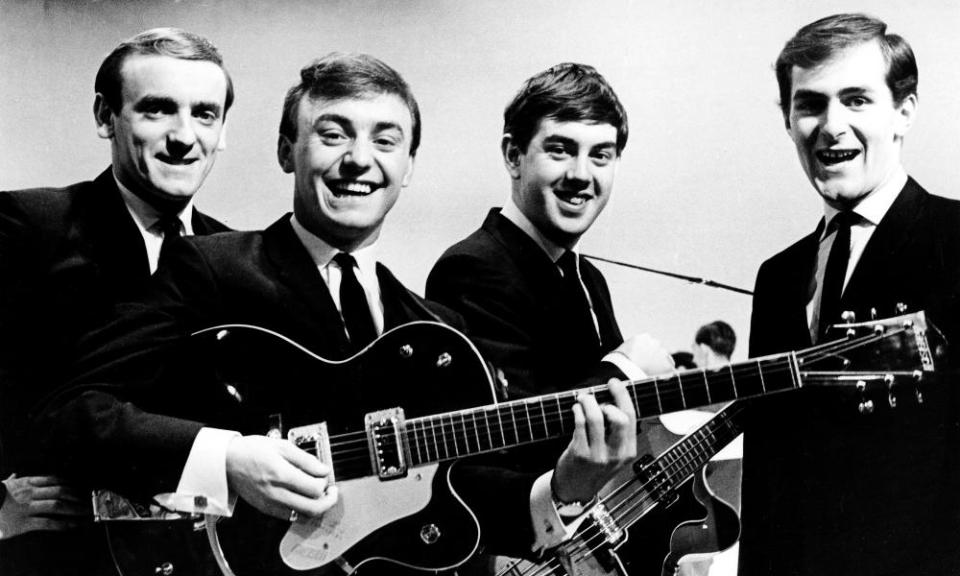Gerry Marsden: 10 of his finest songs

Away from You (1963)
On the B-side of their first single How Do You Do It was this windswept song that had echoes of both sea shanties and lonesome westerns – it certainly wasn’t standard Merseybeat, and had a melancholy that the Pacemakers would later mine on their best remembered songs. The way Gerry Marsden sang “yearns” and “faithful” showed he was someone who wasn’t about to sing in the proscribed cod-American style. Even the Beatles were wary of sounding this scouse.
Don’t Let the Sun Catch You Crying (1964)
Marsden had originally written this for singer Louise Cordet, goddaughter of Prince Philip, who recorded it in a standard bouncy early-60s style and was rewarded with a flop. The song deserved better. George Martin’s beautiful and unusual arrangement (with Marsden’s vocal countered by an oboe on the verse) was considerably slower and gave the Pacemakers their biggest American hit, reaching No 4 in 1964. It became familiar to a later generation thanks to its inclusion on the hugely successful soundtrack album of the 1974 David Essex movie Stardust.
Looking for My Life (1966)
Another reflective song, and the Pacemakers’ final single in North America (it wasn’t released at all in Britain). The odd burst of harmonica suggests Dylan and the lyric is a contemporary shrug: “This old world’s impossible … I won’t join the race, I’m looking for my life.” Yet there’s something deeply impressive, and more Gallic than Anglo-American, about a man in his mid-20s confident and convincing enough to deliver these contemplative songs (Don’t Let the Sun Catch You Crying, Ferry Cross the Mersey, I’ll Be There) with a wisdom based on an understanding of his own turf, and no blind adherence to teenage mores.
Gilbert Green (1967)
A solo single, written by the Gibb brothers, who had recently arrived in the UK from Australia with a case full of songs that they gave away to a bunch of British stars whose crowns had been slipping in the mod-psych era. Adam Faith recorded Cowman Milk Your Cow, Billy J Kramer cut Town of Tuxley Toymaker, and Marsden gave a lovely delivery of Gilbert Green, a vignette about an attic-bound songwriter who “didn’t really know if he was off his head”. Its flamboyant symphonic ending was presumably the music Mr Green had been trying to compose. Magic, but never likely to be a hit single.
It’s Gonna Be Alright (1965)
Furiously thrummed acoustic guitars are again suggestive of the sea, and it’s a sound that looks forward to the La’s and, another decade on, the Coral. The minor chords and simplistic but the positive lyrics (“Now you’re here to stay, you’ll always hear me say it’s gonna be alright”) have a breeze-blown air of troubled innocence. It’s Gonna Be Alright became the opening song for the Pacemakers’ 1965 movie Ferry Cross the Mersey, in which Gerry’s love interest Dodie was played by actor Julie Samuel, mother of singer Sarah Cracknell.
She’s the Only Girl for Me (1965)
Written by Marsden, this moody folk-based song was another, slower, highlight of the Ferry Cross the Mersey soundtrack. The movie sadly seems to be out of circulation – it wasn’t A Hard Day’s Night, but was still a likable snapshot of high-60s Liverpool, with the Pacemakers playing beat-fuelled art students.
Slow Down (1965)
If you want to know how the Pacemakers might have sounded at the Cavern, try this hyped-up live recording of Larry Williams’ song, unreleased until it appeared on an EMI box set in 2008. Guitars are held high and played fast because it was the best way to keep warm in post-war, pre-central heating Merseyside. Underneath them, Les Maguire is giving it the full Jerry Lee treatment, pounding his piano at almost inhuman speed. The odd thing is that this was taken from a show in the US – at the massive Oakland Auditorium – recorded for the four-track Gerry in California EP in early 1965, when America was entirely in thrall to the English beat.
Anyone at All (1965)
Another track kept in the vaults until the 2008 You’ll Never Walk Alone box set. A tricksy arrangement with neat harmonies on the rising chorus, this is late Merseybeat, edging into folk rock. You wouldn’t mistake it for the Byrds, mind you. Like records from the time by their fellow Liverpudlians the Searchers, in spite of their quality you can sense the zeitgeist slipping away from them.
What Makes Me Love You (1967)
The flip side of Gilbert Green was almost as good as the A-side, the kind of thing eBay might now label a “mod dancer”. Again self-written, What Makes Me Love You was a classic product of a mid-60s London studio, with Stax-inspired rhythm guitar, an easy rolling drum sound, and a fine vocal that suggested Marsden would be happy to try new ideas. None of his solo records would make the charts, though.
In the Year of April (1968)
There’s a definite Jimmy Webb influence on this slice of orchestrated pop. It was arranged by Richard Hewson, who would shortly be working with both the Bee Gees and Paul McCartney before forming the RAH Band. It came out on the NEMS label, an offshoot of Brian Epstein’s record shop and management company, which was just about struggling on a year after Epstein’s death. Marsden’s voice is perfectly suited to the material, but he quickly decided he wasn’t going to chase hits; after this, his sporadic recordings from the 1970s onwards usually looked back to his incredibly successful but brief heyday.

 Yahoo News
Yahoo News 